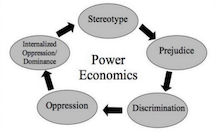
BLOG POSTS
Suffering ≠ Resilience
Last week, I read yet another story of a person who had been through tough times who has now soared above what others believed they could become. The story purported to be one of “resilience,” however stories like this one keep us stuck where we are without pointing us forward.
Last week, I read yet another story of a person who had been through tough times who has now soared above what others believed they could become. The article purported to be one of “resilience,” however stories like this one can keep us stuck where we are without helping us move forward.
Stories like this equate suffering with resilience. Suffering is part of the human condition. Surviving tough times is not necessarily a sign of resilience. Many, many people survive difficult times. How well they do as they move through their lives is more related to their supports (known and unknown) than on their particular hardships. Resilience is about thriving, not surviving. Calling someone resilient after hearing that they’ve suffered sounds positive, but lends itself to a sense of complacency. “They are already resilient, they won’t need other supports.”
This story also seems to be saying, “You see, if this person can do it, all of y’all should be able to do it. And if you cannot, or do not, that is your own fault.” This is a fallacy.
It maintains that the responsibility for “making it” lies solely, directly, on the individual, when in truth, there are many systemic barriers to achieving certain goals in the US, including but not limited to sexism, ableism and racism. When individuals achieve, they do so with the help of many people and systems, known and unknown.
Meanwhile, under the guise of holding up this person as a shining light, the article goes on in great detail about the “failings” of their parents (drugs, jail, child protection involvement). The people in stories like this one are most often people of color, however there is room, too, for very poor white people. This part of the story maintains the idea that some families (poor and/or people of color) are “bad” and unable to sufficiently nurture and raise their children. Being silent on the forces of those “isms” I mentioned earlier implies that they do not exist.
Next the story shows the child in a “family” picture with their new family, all white. In the family picture, the African American individual has their hair completely straightened and combed to match the other family members. A nice, white savior family. Who turned this child’s life around. It says nothing of this family’s history or even their hard work raising children. It implies by its lack of explanation, that they were able to do it because they were “good” people. In truth, that family had to work hard to support this child (and others), and that family had other supports – foster youth workers, teachers, counselors, principals, other family members, coaches, friends, co-workers – and others I haven’t named because the article didn’t mention any of them.
Results of a search for “foster family”
Let me be clear – I am a fan and supporter of foster care families. I know how hard they work and love their children. I do not believe that the family in the story are walking around saying, “We’re a good, white savior family, and we should be praised.” I really don’t. However I do believe that articles like these perpetuate that story line. Without the people in the story knowing. Maybe even without the author of the story knowing! This story line is one that is so deeply embedded in American culture it goes unacknowledged.
Stories like this one keep us separate and judgmental, ignores external forces and internal work. And they do nothing to point us in the right direction to encourage actual resilience, which is about believing we have the resources (or can get them) to meet challenges and overcome vulnerabilities. We can foster resilience, in families, friendships and schools. I believe a more powerful, change provoking story would tell us about that journey.
Be Productive
I am resting today. I have an uneasy relationship with rest, one that comes from my own childhood trauma, as well as the sociocultural trauma of being seen as “other” in a white superiority context.
I am resting today. I have an uneasy relationship with rest, one that comes from my own childhood trauma, as well as the sociocultural trauma of being seen as “other” in a white superiority context. Growing up my (North Korean) mother reminded me many times that my behavior would be directly related back to her, and that I needed to be even better than my peers to be seen as “just as good.” My mother’s own childhood experiences and introduction to white cultural values lead her to see non-movement as laziness. I loved reading and would do so in any moment, but my mother saw that as non-productive. I used to hide so I could read in peace. I would drive my sister crazy by locking myself in the bathroom for long periods of time, then hiding my book in the hamper before coming out.
“What?” I would say, innocently. “I had to goooo.”
Even now, many years later, I have a hard time resting. I have been sick since Saturday, congested and coughing, with a headache.
Saturday I worked all day.
Sunday, my one day off, I did laundry, cleaned up, took the dog to the park and prepped for the week. I did take a nap – but woke up feeling guilty so answered emails for an hour after that.
Monday I took the dog to the park, went in to my office to meet with my colleague for an interview, and by the time we were done I could hardly think straight. I called off dinner with a friend (sorry!), and participated in a very cool interview with students in Singapore. Then I called in sick for Tuesday (it’s only the second time all school year I’ve done so).
And so here I am, supposedly resting. But is it resting when the guilt keeps me from sitting down? From reading, even? From reading books I want to read for work?! The values of white supremacy culture (see a list plus antidotes from Kenneth Jones and Tema Okun, 2001 here) have me riding the guilt train. Starting with a sense of urgency that I get from work partners and colleagues is so strong that I feel like I need to be checking my email all the time. Quantity over quality is telling me I need more…things, more deliverables, more speaking engagements, more more more. I am even feeling guilty for not going to the gym today. The gym! Can you imagine me, coughing and blowing my nose while I work out?
And so, here I am. Producing something. Done.
Sociocultural Trauma
I know that people don’t really want to talk about trauma. Trauma in whatever form can be disheartening, scary and sometimes just plain sad. Lately it’s been different, though. These days, I find myself talking more and more about sociocultural trauma - trauma caused by implicit and explicit bias (e.g. racism, sexism, ableism).
I know that people don’t really want to talk about trauma. Trauma in whatever form can be disheartening, scary and sometimes just plain sad. Lately it’s been different, though. These days, I find myself talking more and more about sociocultural trauma - trauma caused by implicit and explicit bias (e.g. racism, sexism, ableism). This topic is even harder to talk about, because it requires each of us to examine, acknowledge and actively address our own implicit and explicit biases.
Although I regularly tell participants that research shows that trauma happens to people across all kinds of socioeconomic/racial/gender boundaries, it still happens, I think, that people in my trainings start to believe that we are talking about “those people over there” with trauma. Not because they are bad people, but probably because it is easier to think of it that way, a little bit removed from one’s self. Then when I start talking about common implicit biases, people often become uncomfortable. No one wants to think of themselves inadvertently harming other people! And yet we do. All of us.
In one of my schools there is a blind educator. Early on in my work with the school, I said something like, “Look at this diagram,” then realized that she wouldn’t be able to do so, and that me not having made it available to her and then referencing it was a microaggression. As soon as I realized it, I started noticing other things that I say which show the same bias (examine). The English language is SO biased towards people with sight! There are many terms and phrases that I use all the time.
I eventually had a conversation with her about it, and apologized (acknowledge). Eventually because at first, I was too embarrassed to even bring it up. She was gracious and accepted my apology and was helpful, too. She let me know that there are some phrases and figures of speech that she can laugh about, and that there are others that really do bother her. She even took part in a planned role play for handling a microaggression. I like this person. I really, really do not want to harm her.
And yet, months later, I still catch myself doing it. When I wrote her to ask for her permission for this post, I wrote, “Looking forward to meeting with you” because I knew it wouldn’t be appropriate to write “See you next week.” But guess what? Looking forward is still sight-centric! (actively address)
The educator in question is actually able to hold this topic lightly – but that does not mean that I need not try. Because I know that sociocultural trauma impacts people, not only in the thinking/learning part of their brains, but also at the feeling part of the brain (which I wrote about here). That means that maybe, on a day when I’m stressed out, a minor comment that I could laugh off on other days might push my rider right off my horse.
We don’t need to be perfect, and we still need to do our work: examine our way of being in the world to uncover our biases, acknowledge them, and then actively work to address them.
Legislation Matters
The HEARTS team met folks from Californians for Safety and Justice (CSJ) in April last year when they contacted us about AB2701, a bill that sought to create a state-wide grant program for providers of school-based trauma services using the HEARTS program approach as a model. Dr. Dorado and I worked with the team just before it was presented and I was excited to testify at a hearing about the bill. I went to Sacramento day before to see another hearing taking place and spent hours talking with members of the team about my testimony.
I was so nervous that morning that I was sweating even in the freezing cold courtroom. When it was finally my turn to talk, I literally had less than 60 seconds. For those of you who have seen me speak, you know that limiting my talk time was something like torture for me.
I felt like I was doing fine at first, and then the Committee Chair, Reginald B. Jones-Sawyer, Sr., smiled at me. I was thinking, “Yes! He’s totally interested in what I’m saying!” Then he made a little circle with his index finger in the time-honored sign for “wrap it up.” My last line was less than eloquent. In June we found out that the bill was held in the assembly appropriations committee, which meant that it wouldn’t move forward in that legislative session.
Last week we heard from the team at CSJ again, and I met them to talk about Assembly Bill 258. This is a bill that they are working on that would increase in-school support services to pupils in order to break down barriers to academic success. I’m excited to work with this amazing group of people again and hopeful about the supports that might come of this work.
The fabulous team from CSJ out in front of the Women of the Resistance Mural on Balmy Ally.










